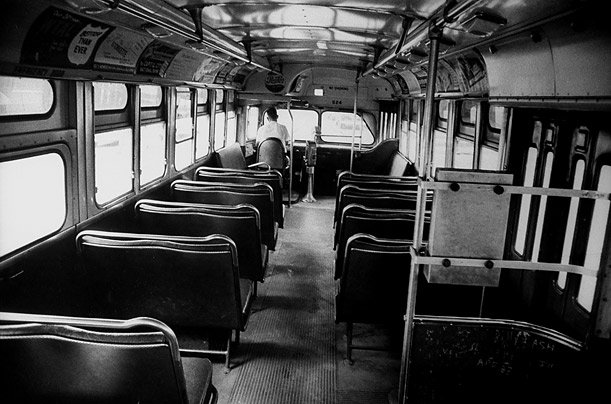Teaching the Montgomery Bus Boycott
Students learn from pre-school through high school that Rosa Parks refused to give up her seat in Montgomery, the buses were desegregated, and the Civil Rights Movement was launched. The disconnect between Rosa Parks’ arrest and the 381-day boycott creates the illusion that it was a spontaneous response to Rosa Parks’ civil disobedience. This, however, discounts the strategic brilliance and courage of the African American community in Montgomery.
It is critical for students to learn that 50,000 citizens had to sacrifice everyday for over a year to sustain the boycott and change the course of our history. Recognizing the citizens of Montgomery does not diminish the actions of the politically astute Rosa Parks, but rather puts her in context of a greater social struggle for justice.
As Herbert Kohl explains in the classic article, The Politics of Children’s Literature,
When the story of the Montgomery Bus Boycott is told merely as a tale of a single heroic person, it leaves children hanging. The idea that only special people can create change is useful if you want to prevent mass movements and keep change from happening.
Teaching Resources
Use these resources to teach a more complete story about the Montgomery Bus Boycott.
Quiz
Montgomery Bus Boycott Quiz
This “learn-as-you-go” quiz, created by Teaching for Change, is designed for grades 6-12 and for professional development.
Lessons
The Montgomery Bus Boycott: Understanding the Organizing Tradition
This Zinn Education Project lesson focuses on how the tactics of activists — which evolved over time in response to mounting white resistance — helped secure the boycott’s victory.
Dramatization of the Bus Boycott for First and Second Grade
How to introduce the story of the boycott to young children. By Maggie Donovan. From Putting the Movement Back into Civil Rights Teaching.
Books
Civil Rights Teaching: Montgomery Bus Boycott
Books for learning and teaching about the Montgomery Bus Boycott that help put Rosa Parks and the boycott in the context of a greater struggle for social justice.
Primary Documents and Articles
The Politics of Children’s Literature: What’s Wrong with the Rosa Parks Myth
A critical analysis by Herb Kohl (originally published by Rethinking Schools) that challenges the myths in children’s books about Rosa Parks and the Montgomery Bus Boycott.
Civil Rights Movement Veterans Website
The CRMvet.org website offers a detailed, highly engaging narrative history of the Montgomery Bus Boycott within a historical context. The narrative includes first person testimonies and links to primary documents.
National Archives and Records Administration
The National Archives includes the arrest records of Rosa Parks in their teaching with documents collection.
Freedom’s Main Line
Learn how activists in Louisville, Kentucky successfully campaigned against segregated streetcars in 1870-71 in this article from the Teaching Tolerance booklet, “A Place at the Table.”
Widespread Boycotts at the Turn of the Century
Read about dozens of boycotts by African Americans in “The Boycott Movement Against Jim Crow Streetcars in the South, 1900-1906” by August Meier from the Journal of American History.
Library of Congress
The Library of Congress houses an extensive collection on Rosa Parks and the Montgomery Bus Boycott.
Film and Audio-Visual
Teaching About the Montgomery Bus Boycott
In this short film, Teaching About the Montgomery Bus Boycott, first grade teacher Maggie Donovan (SNCC veteran) introduces her students to the fight to desegregate the buses, placing Rosa Parks in the context of the larger community efforts. This film by Teaching for Change is ideal for professional development workshops. 2006. 15 min.
Eyes on the Prize: American Civil Rights Movement 1954-1985
Eyes on the Prize, the award-winning 14-hour television series, produced by Blackside and narrated by Julian Bond, includes a segment on the Montgomery Bus Boycott.
Boycott
A made-for-TV movie that dramatizes the events of the Montgomery bus boycott, weaving vintage newsreel footage with scenes depicting the grassroots organizing and leadership challenges. It is an older film, however it does a good job of challenging the traditional narrative. Actors include Carmen Ejogo and Terrence Howard. 2001. 120 minutes.
Women and the Civil Rights Movement
Professor Elsa Barkley Brown produced a PowerPoint presentation on women in the Civil Rights Movement with a focus on the long history of resistance to segregation on public transportation. Posted here with permission of the author.
Please email us if you have corrections and/or any resources we can add for teaching about the Montgomery Bus Boycott.

